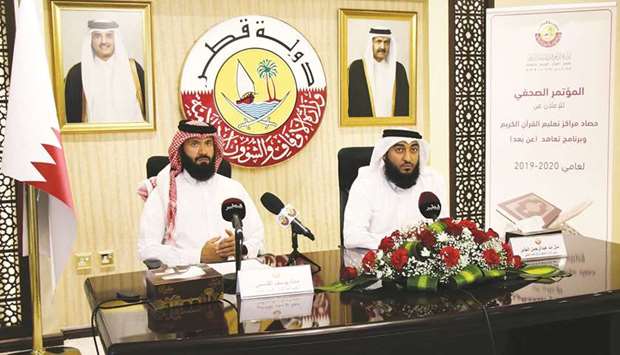The Ministry of Endowments and Islamic Affairs (Awqaf), represented by the Department of Religious Call and Guidance, has chalked out a plan to set up more centres to teach women the Holy Qur'an. While explaining the achievements of the department at a press conference on Monday, department director Malullah Abdurahman al-Jaber said six buildings will be set up as the headquarters of centres for teaching women the Holy Qur'an.
There are 162 government centres covering all areas of Qatar to teach the Holy Qur'an for men and women. There are more than 22,000 learners of all ages. These centres extend various services including teaching them alphabets and giving them recitation and memorisation lessons in various stages,” al-Jaber explained.
The department takes care of the centres while providing the learners with qualified mentors along with all means of the educational process. “In recent times, the administration has provided qualitative and advanced programmes that keep pace with time and overcome difficulties. In order to overcome the Covid-19 pandemic hardships, the teaching became remote through visual communication programmes,” al-Jaber noted adding that 4,000 students were part of ‘Taud’ online programme launched to help students learn and memorise the Holy Qur'an.
Muaath Yusuf al-Qaasmi, director of the Section of Qur'an and its Sciences at the Department of Religious Call and Guidance, said the section added several achievements in 2019 to its credit, with 16,000 students being part of 140 centres during the morning and evening sessions. During 2020 due to Covid-19, the students were unable to join the centres. "Around 80 students including three Qataris memorised the Holy Qur'an in 2019 and three Qatari youth achieved advanced positions in international competitions.
“The programme of learning the Holy Qur’an during last Ramadan witnessed the participation of 531 students. The section has launched a refresher course to review the Noble Qur'an for Qatari imams in preparation for Ramadan in co-operation with the Awqaf’s Mosques Administration. The programme that will continue until the end of April first week will be attended by 22 students.
The department takes care of the centres while providing the learners with qualified mentors along with all means of the educational process. “In recent times, the administration has provided qualitative and advanced programmes that keep pace with time and overcome difficulties. In order to overcome the Covid-19 pandemic hardships, the teaching became remote through visual communication programmes,” al-Jaber noted adding that 4,000 students were part of ‘Taud’ online programme launched to help students learn and memorise the Holy Qur'an.
Muaath Yusuf al-Qaasmi, director of the Section of Qur'an and its Sciences at the Department of Religious Call and Guidance, said the section added several achievements in 2019 to its credit, with 16,000 students being part of 140 centres during the morning and evening sessions. During 2020 due to Covid-19, the students were unable to join the centres. "Around 80 students including three Qataris memorised the Holy Qur'an in 2019 and three Qatari youth achieved advanced positions in international competitions.
“The programme of learning the Holy Qur’an during last Ramadan witnessed the participation of 531 students. The section has launched a refresher course to review the Noble Qur'an for Qatari imams in preparation for Ramadan in co-operation with the Awqaf’s Mosques Administration. The programme that will continue until the end of April first week will be attended by 22 students.

